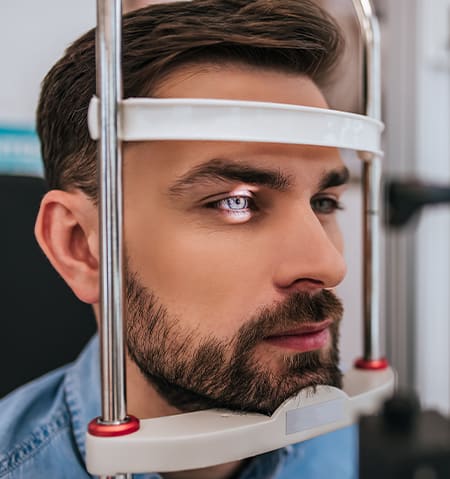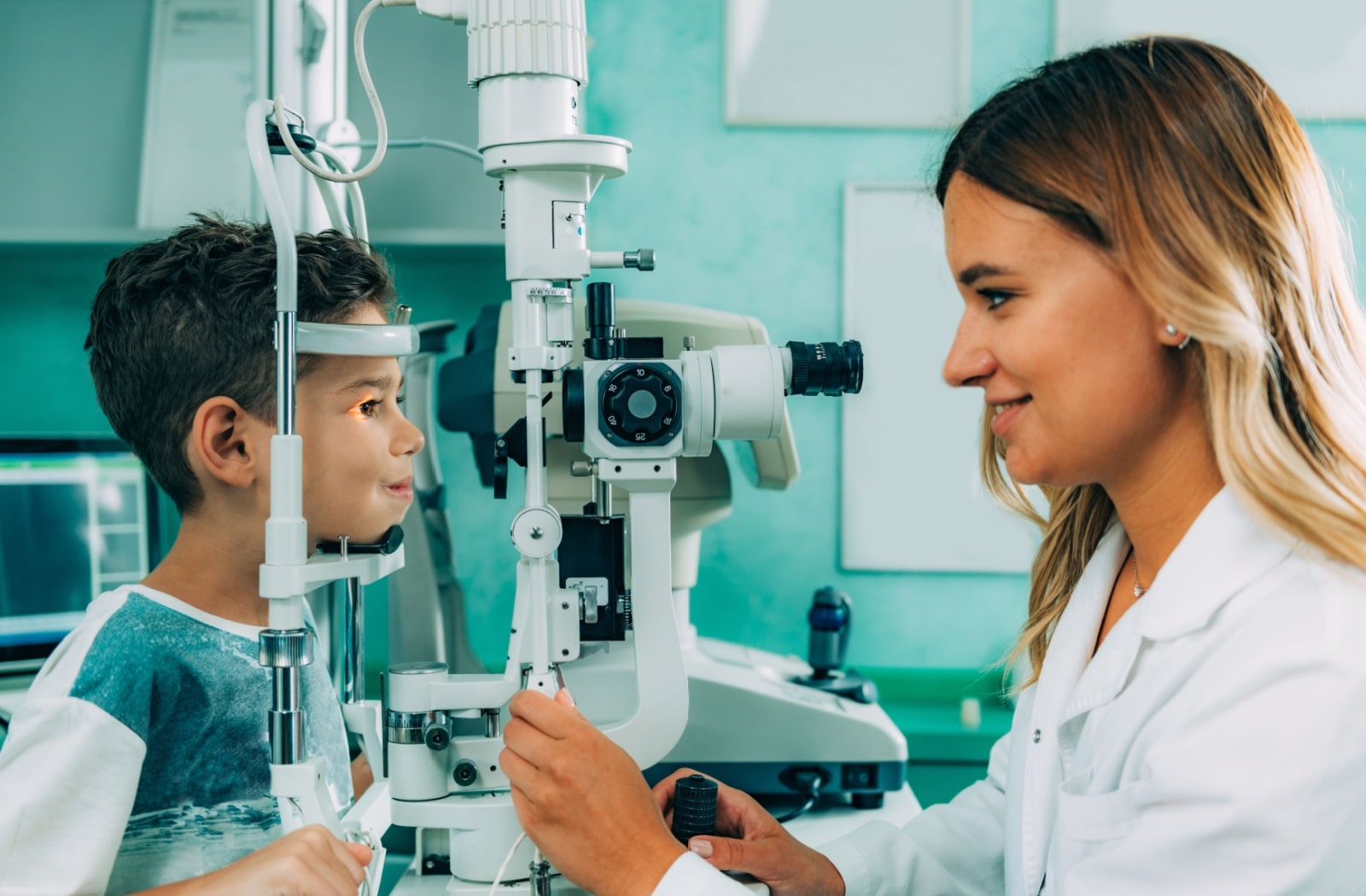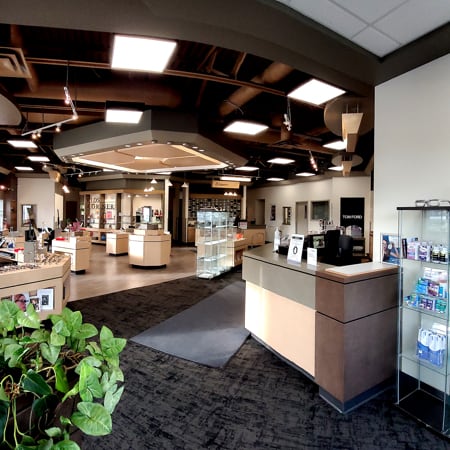Establishing Healthy Vision
Eye exams are the foundation of strong eye and vision health. No matter your age, it’s important to keep up with regular visits to the optometrist. Every eye exam is your opportunity to know your eyes are safe from eye diseases and your prescription is up to date.
During your eye exam, we’ll run a variety of comprehensive tests to check your visual acuity, and identify any refractive errors, like nearsightedness, farsightedness, and astigmatism. If you have any questions during your appointment, our team is always happy to take the time to answer them.



When Should I Get an Eye Exam?
The importance of eye exams shouldn’t be underestimated. Your eyes help you see the things you love most in your life. An eye exam ensures any issues are identified early and proper management or control methods are used.
Eye diseases can be tricky, as they don’t always show early warning signs or symptoms. This means eye exams are one of the only ways to identify and treat problems early.
To best support the health of your eyes, the Canadian Association of Optometrists recommends the following eye exam frequencies:
- Adults (ages 20–64) should have an exam every 2 years.
- Seniors over 65 should have an annual exam.
Common Eye Diseases
Even though patients aren’t always able to identify eye diseases, it’s important to be aware of the common eye diseases facing Canadians and which individuals are at higher risk.
Cataracts
Cataracts are a normal part of the eye’s aging process but are mostly found in patients over 60. They occur when the natural lens of the eye begins to cloud and become foggy. This clouded lens makes it hard for patients to see clearly and can often make colours dull and muted.
To help manage vision affected by cataracts, stronger lenses can be used. However, to be treated, cataracts require surgery. Cataract surgery involves removing the eye’s clouded lens and replacing it with a new artificial lens.
Glaucoma
Glaucoma is one of the leading causes of blindness in people over 60 years of age. Even though the disease has very few early symptoms, it can still cause damage without patients knowing. Glaucoma targets the optic nerve, the area responsible for transferring visual information to the brain.
For early glaucoma diagnosis, eye exams are crucial. If glaucoma management is started early, vision loss or blindness can be prevented.
Diabetic Retinopathy
Diabetic retinopathy is developed in patients with diabetes. The disease is caused by the effects of diabetes on a patient’s blood vessels. Since the blood vessels in the eye are very delicate, they have a high chance of breaking. If broken, they can cause blurry vision, vision loss, or even blindness.
Patients with diabetes require special and more frequent eye exams to make sure their eyes are getting the care and support they need.

Schedule Your Next Visit
Have you booked your family’s next appointment? Book today!

Our Location
Wanna see what we’re all about?
From our practice’s architecturally stunning office to our warm and welcoming staff, visiting Total Focus Optometry is always an enjoyable experience.
Our team can’t wait to meet new patients and see friendly returning faces!
Our Address
- 3352 Gateway Blvd. NW
- Edmonton, AB T6J 6V1
Contact Information
- Phone: 780-988-3937
- Fax: 780-988-5809
- Email: [email protected]
Hours of Operation
- Monday: 9:00 AM – 6:00 PM
- Tuesday: 9:00 AM – 8:30 PM
- Wednesday: 9:00 AM – 6:00 PM
- Thursday: 9:00 AM – 8:30 PM
- Friday: 9:00 AM – 6:00 PM
- Saturday: 9:00 AM – 4:00 PM
- Sunday: Closed
Our Brands





Our Google Reviews
Join Our Newsletter

Our Blog
Myopia vs. Hyperopia: What’s the Difference?
Eye ConditionsMyopiaEssentially, myopia leads to blurred vision when looking at distant objects, whereas hyperopia causes objects close by to appear blurry. They stem from similar causes but affect vision in opposite ways. The presence of either condition can greatly affect someone’s ability to see with clarity. […]
When Should My Child Have Their First Eye Exam?
Children’s Eye CareEye ExamsIt’s advised by eye care professionals that children undergo their first eye assessment between six months to one year of age, even in the absence of visible vision issues. Adopting a preventive approach is important in managing ocular health and can help circumvent potential eye diseases and emergencies through routine exams and a wholesome lifestyle. […]
What is Blue Light Protection for Glasses?
Eye HealthGlassesWith this increased screen time comes exposure to blue light, which has raised concerns about its potential effects on eye health. As a result, blue light protection for glasses has become a popular topic. Blue light protection for glasses refers to the use of special lenses designed to filter out or block blue light from reaching the eyes. […]
Myopia vs. Hyperopia: What’s the Difference?

Essentially, myopia leads to blurred vision when looking at distant objects, whereas hyperopia causes objects close by to appear blurry. They stem from similar causes but affect vision in opposite ways. The presence of either condition can greatly affect someone’s ability to see with clarity. […]
When Should My Child Have Their First Eye Exam?

It’s advised by eye care professionals that children undergo their first eye assessment between six months to one year of age, even in the absence of visible vision issues. Adopting a preventive approach is important in managing ocular health and can help circumvent potential eye diseases and emergencies through routine exams and a wholesome lifestyle. […]
What is Blue Light Protection for Glasses?

With this increased screen time comes exposure to blue light, which has raised concerns about its potential effects on eye health. As a result, blue light protection for glasses has become a popular topic. Blue light protection for glasses refers to the use of special lenses designed to filter out or block blue light from reaching the eyes. […]












